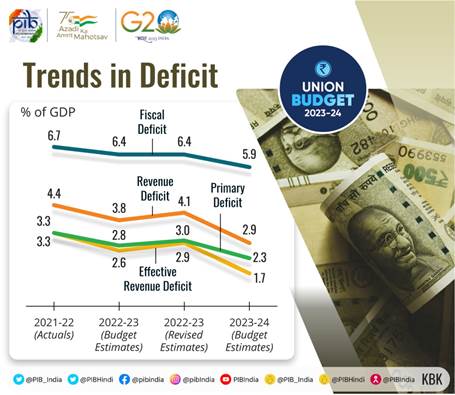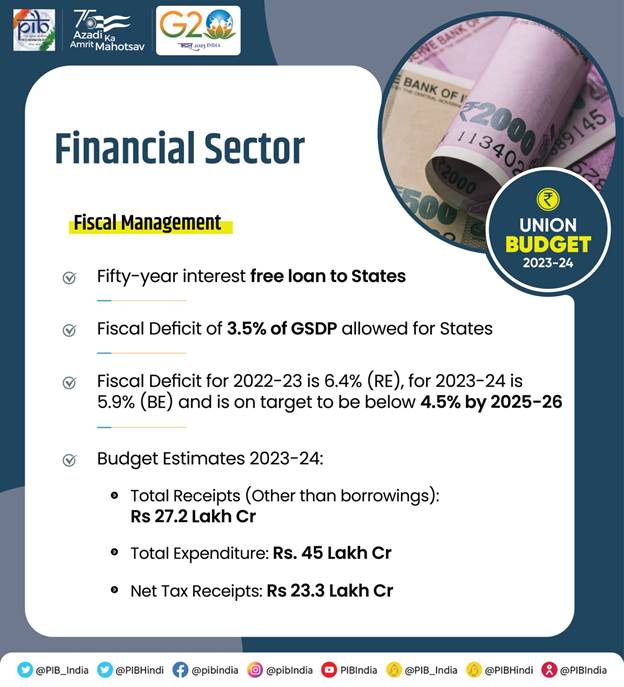Continuing the path of fiscal consolidation, the Government intends to bring the fiscal deficit below 4.5 per cent of GDP by 2025-26. This was stated by the Union Minister for Finance and Corporate Affairs Smt. Nirmala Sitharaman while presenting the Union Budget 2023-24 in the Parliament today.
The Finance Minister further stated that the fiscal deficit is estimated to be 5.9 per cent of GDP in BE 2023-24. To finance the fiscal deficit in 2023-24, the net market borrowings from dated securities are estimated at Rs. 11.8 lakh crore. The balance financing is expected to come from small savings and other sources. The gross market borrowings are estimated at Rs. 15.4 lakh crore.
In Budget Estimates 2023-24, the Finance Minister stated that the total receipts other than borrowings and the total expenditure are estimated at Rs. 27.2 lakh crore and Rs. 45 lakh crore respectively. Moreover, the net tax receipts are estimated at Rs. 23.3 lakh crore.
In the Revised Estimate 2023-24, the Finance Minister stated that the total receipts other than borrowings is Rs. 24.3 lakh crore, of which the net tax receipts are Rs. 20.9 lakh crore. The Revised Estimate of the total expenditure is Rs. 41.9 lakh crore, of which the capital expenditure is about Rs. 7.3 lakh crore. The Revised Estimate of the fiscal deficit is 6.4 per cent of GDP in RE 2022-23, adhering to the Budget Estimate.

Revenue deficit
The Finance Minister stated that the revenue deficit is expected to be at 2.9 % in FY 2023-24 over 4.1% in 2022-23. Back-to-back global headwinds and global economic uncertainties continue to pose constraints which are often beyond the direct control of domestic economic policy levers. Although, new development and welfare-related expenditure commitments, buoyancy in tax receipts and targeted expenditure rationalization during the year, have helped to continue with the thrust on rapid inclusive development.
The fiscal policy statement noted that in FY 2022-23, due to the sudden outbreak of geopolitical conflict that jeopardized food and energy security, there was a higher food and fertiliser subsidy requirement for supporting the vulnerable and ensuring macroeconomic stability.
Smt. Sitharaman reiterated government’s commitment to pursue a broad path of fiscal consolidation to attain a level of Fiscal Deficit lower than 4.5 per cent of GDP by FY 2025-26. The Government would continue with its efforts to attain sustained, broad based economic growth, and take such measures as may be necessary to protect the lives/ livelihoods of the people, while adhering to the path of fiscal rectitude.
|
|
Revised estimates(2022-23)
|
Budget estimates(2023-24)
|
|
Fiscal Deficit
|
6.4%
|
5.9%
|
|
Revenue Deficit
|
4.1%
|
2.9%
|
Tax revenue
Gross Tax Revenue (GTR) is projected to grow at 10.4 per cent in FY 2023-24 over FY 2022-23. Both, the Direct and Indirect Tax receipts are individually estimated to grow at 10.5 per cent and 10.4 per cent, respectively. It is estimated that the Direct and Indirect taxes to contribute 54.4 per cent and 45.6 per cent, respectively, to GTR noted the fiscal policy statement. The Tax to GDP ratio is estimated at 11.1 per cent.
The overall medium term thrust of the tax policy is towards rationalizing tariff structure and widening the tax base. This is being achieved by removing tax inversions which have crept in the tax structure and pruning the exemptions. In addition, measures are being taken for widening the tax base, easing compliance for the taxpayers, formalization of the supply chain and improving ease of doing business.
The balance between Revenue receipts and Revenue expenditure
The total revenue receipts and revenue expenditure of the Centre are estimated at Rs. 26.32 lakh crore and Rs. 35.02 lakh crore, respectively, in BE 2023-24. Based on this, the ratio of revenue receipts to revenue expenditure is estimated at 75.2 per cent in BE 2023- 24 improving from 67.9 per cent and 67.8 per cent in RE 2022-23 and FY 2021-22, respectively. Tax-GDP ratio has improved from 10.7 per cent in BE 2022-23 to 11.1 per cent in RE 2022-23 and BE 2023-24
Non tax revenue
Non Tax Revenue is estimated to contribute 11.5 per cent of the Revenue Receipt and is projected to be at Rs.3.02 lakh crore which is 15.2 per cent more than the RE 2022-23 of Rs.2.62 lakh crore.
Non-debt capital receipts
Non-Debt Capital Receipts (NDCR) in BE 2023- 24 is estimated at 84,000 crore which includes the receipts under the recovery of loans and advances (23,000 crore), receipts from Monetisation of Roads (`10,000 crore), etc. The actual realisation of the NonDebt Capital Receipts significantly depends on the prevailing market conditions, expected valuation assigned to the Government stake etc.
Capital expenditure to Fiscal Deficit Ratio
The ratio of capital expenditure to Fiscal Deficit (Capex-FD) is estimated at 56.0 per cent in BE 2023-24 as compared to 41.5 per cent in RE 2022-23 and 37.4 per cent in FY 2021-22.

Fiscal Deficit of States
The Finance Minister stated that the States will be allowed a fiscal deficit of 3.5 per cent of GSDP of which 0.5 per cent will be tied to power sector reforms. States will also be provided a fifty-year interest free loan. The entire fifty-year loan to states has to be spent on capital expenditure within 2023-24. Most of this will be at the discretion of states, but a part will be conditional on states increasing their actual capital expenditure. Parts of the outlay will also be linked to, or allocated for, the following purposes:
- Scrapping old government vehicles
- Urban planning reforms and actions
- Financing reforms in urban local bodies to make them creditworthy for municipal bonds
- Housing for police personnel above or as part of police stations
- Constructing Unity Malls
- Children and adolescents’ libraries and digital infrastructure
- State share of capital expenditure of central schemes
******`
RM/BB/PM/SM